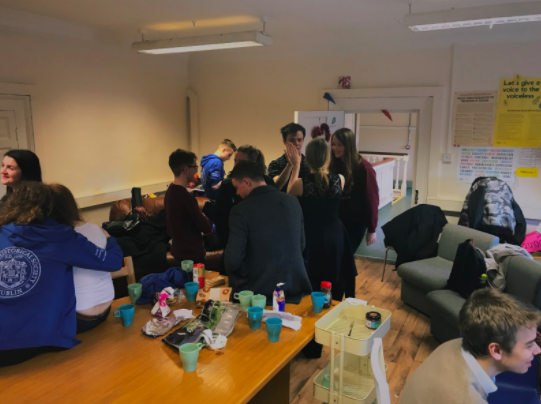Topics like Brexit, Palestine, and the Eighth Amendment can cause awkward silences at some dinner tables, but at Trinity Politics Society (PolSoc), these are mere conversation starters. On Thursday afternoons, vociferous chatter emanates from the top floor of House Six, where the society holds its weekly “Caffeinated Conversations” get-together.
Indeed, both coffee and conversations are aplenty here, a winning combination in the eyes of the society’s Social Secretary Niall Maher, who says: “Provide food and tea, and they will come.” The room is that of political enthusiasts, with an impressive library of books by everyone from Hillary Clinton to Karl Marx, and a cardboard cutout of Donald Trump to keep an eye on things from the corner.
Chair of the society is Eunice Collins, a third year Law student. Although the bulk of the crowd hails from the Arts Building, Collins says that the group is diverse, including international students and those whose courses have nothing to do with politics. There is some overlap with members of the College’s debating societies, something which becomes clear as passionate discussions break out above the noise. Topical news stories and key political dilemmas dominate conversations in the room; some discuss the Israel/Palestine conflict, while others weigh up the best ways to provide international aid.
The society itself does not support any particular ideology or political party, acting more as a facilitator of discussions. In fact, discussions, and the act of asking questions, appears to be at the very centre of what this society does. Collins says that asking questions, and “having someone to bounce ideas off,” is the best way to learn about politics.
PolSoc aims to provide opportunities to do just this; in all of its recent panels and talks, there has been a question and answer element to the event. Last year saw events centred around themes such as political philosophy, the Catalonian independence movement, and Britain’s vote to leave the EU, all of which featured prominent Irish or international voices and experts who gave academic insight into the issues at hand.
A quick scroll through PolSoc’s Facebook page shows a lengthy list of past talks, many of which were run in collaboration with other Trinity societies. The Society for International Affairs (SOFIA), one of PolSoc’s frequent collaborators, is teaming up with the society again on February 12, bringing an intriguing “Model Dáil” to the College chapel. Here, treaty debates from 1916 will be revisited, with students channelling the likes of Eamon De Valera and Michael Collins.
Members of the youth factions of Fine Gael and Fianna Fáil are set to participate in the debate, which is sure to generate some entertaining rivalry. This is not a society which backs away from conflict; in the same vein, one of its events last year pitted the Social Democrat Stephen Donnelly against a member of the right-wing UKIP.
The “backbone” of the society, as dubbed by its Social Secretary, is its aforementioned weekly coffee gathering. Any student interested is encouraged to come along and delve into both the scandalous and the more mundane political developments of the week.







